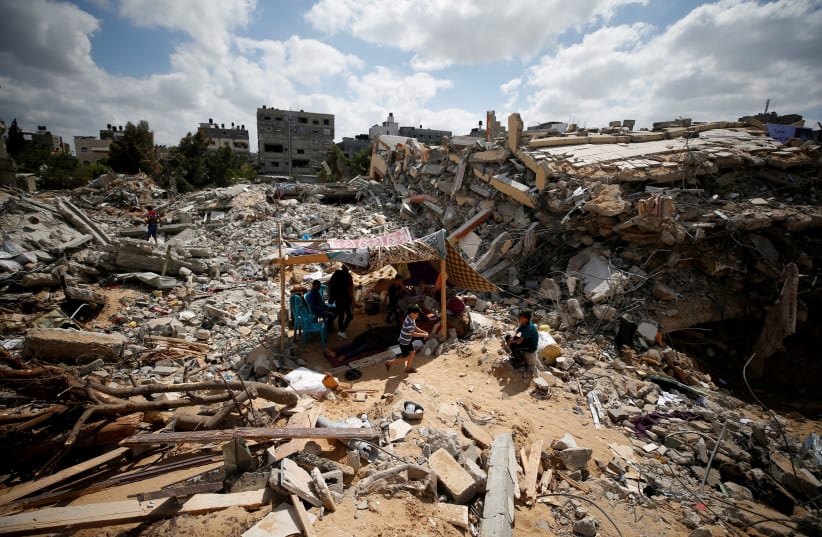In the 2009, 2012 and 2014 hostilities, UN officials, human rights NGOs, and many members of the international legal community routinely – even casually – accused Israel of committing war crimes in Gaza. They repeatedly alleged that the IDF intentionally directed attacks against civilians, deliberately inflicted disproportionate harm to civilians, and caused wanton destruction of property without military justification.
So the accusations of disproportionate attacks that have been widespread in relation to the May 2021 fighting are not new – even as almost all politicize and incorrectly interpret the legal standard. IHL prohibits direct attacks on civilian objects, but they can become military objectives and subject to legal targeting if used for military purposes. Attacks must also comply with proportionality, which requires the weighing of civilian harm with the anticipated military advantage. This standard is judged by the information known to the attackers prior to any strike and not based on its outcome.
Despite this well-established legal framework, a new narrative has begun to emerge, namely that there is a fundamental problem with IHL itself.
The positing of this new standard seems directly tied to overwrought criticism of Israeli military operations in Gaza. The new argument claims that the laws of armed conflict are problematic because they reinforce the power imbalance between Israel and the Palestinians and perpetuate the supposed unfairness in Israel’s defensive ability. Under any interpretation of the law, however, Israel is permitted to respond to Hamas rocket attacks on its civilian population centers with overwhelming force, provided it complies with the rules of distinction and proportionality. This does not change even though Israel’s population is largely “protected” by the Iron Dome missile-defense system and shelters.
Sectors of the legal academic community – the “invisible college” – are the source of this repositioning. And as night follows day, UN bodies and human rights NGOs have followed their lead. For instance, on a webinar on May 24 (curiously sponsored, given the imbalance of perspectives proffered, by the International Bar Association), Prof. Leila Sadat of Washington University offered the opinion that when considering the legal structure of conflict, as a first principle, states must show self-restraint, and should not view the rules of IHL as “how much you can get away with.”
Prof. Adil Haque, whose 2017 monograph “Law and Morality at War” introduces radical new conceptions of proportionality into IHL, tweeted on May 15, “The IDF clearly wants to turn the leveling of civilian homes into an arcane debate over the individuation of ‘objects’ under IHL. These strikes are illegal. They are also ‘clearly’ immoral. The focus should be on the latter imho.”
And, in a May 19 post on OpinioJuris.org, an international law blog, Prof. Alonso Gurmendi went so far as to argue, “The law of war is an extremely defective medium for debating the legality or illegality of a particular strike,” and “trying to rethink it in response is a worthwhile endeavor.”
These comments not only degrade the careful balance that has been sought in the IHL framework between civilian protection and military necessity, but also reward actors (like Hamas) that have no respect for law. They erode states’ rights to act defensively through deployment of their deterrence capabilities, as well as by eliminating the agency or responsibility of malign actors. In addition, the new “standards” that are said to flow from this discourse punish states that invest in protecting their civilian populations, such as through shelters and the Iron Dome system, and as required by law. As such, this discourse not only inaccurately frames the laws of armed conflict, it is also arguably immoral in and of itself.
The discourse, which without irony uses the rhetoric of human rights to undercut international law, diverts attention from the incontrovertibly illegal attacks by Hamas and Palestinian armed groups on Israeli civilian population centers. In 11 days, Palestinians fired more than 4,300 rockets at Israeli towns and cities (compared to 2014, when 4,500 were fired during the entire 50-day conflict). These were assaults that could not, and should not, have been minimized or ignored.
The rhetoric also appears to be a response to the precision and sophistication of the IDF’s targeting in response to these indiscriminate attacks. Although verifiable casualty figures are not yet fully known, intelligence released to date indicates that significant numbers were targeted combatants or civilians killed by short-falling Palestinian rockets.
There are few conflicts in the world that engender the obsession or outrage characteristic of the Israeli-Palestinian conflict. A Jewish state that is able and willing to defend itself and protect its citizens against a terrorist entity seems to make many people in the international community uncomfortable. In such circumstances, we can expect to see more attempts to reframe the conversation in order to further move the legal goalposts.
The writer is the legal adviser of NGO Monitor, a Jerusalem-based research institute.
